Amid arrests, Executive Council votes 4-1 to reject federal funds for COVID vaccines
| Published: 10-15-2021 10:40 AM |
Kathleen Labonte celebrated the Executive Council’s vote to reject $27 million in federal funding for COVID vaccinations Wednesday, saying it showed that protestors had successfully pressured their elected representatives.
Labonte, a 71-year-old former state employee, said she takes no medicine and favors holistic healing methods rather than vaccines.
“They would’ve just rammed that through, but we inundated our councilors,” Labonte said. “This movement has grown.”
About an hour into a tense Executive Council meeting at the Police Standards and Training Council, two weeks after the last meeting was canceled when state officials said they were concerned for their safety, a New Hampshire state police officer warned the crowd that any further disruptions of the proceedings would lead to arrests for disorderly conduct.
The arrests of Albert J. Todd, 32, and Marylyn Todd, 37, broke an uneasy truce, after the crowd gave loud responses during the Pledge of Allegiance and discussion of refugees. The married couple from Nashua were featured in a 2013 WMUR story about A.J., a Navy Petty Officer, meeting his baby daughter Kylie for the first time at Logan International Airport.
After a shouted outburst from A.J., state police officers escorted him out, before removing Marylyn as she carried her young son Leland in her arms. State Police Sgt. Nathan Johnston kept Leland safe and occupied while his parents were taken into custody.
Nine protestors in all were arrested at the Police Standards and Training Council on Wednesday for disorderly conduct, according to state police. Terese Grinnell, a Concord area nurse who has protested vaccine mandates for health care workers outside Concord Hospital, was among those to face charges.
The five-member Executive Council voted to approve an increase of $13 million in spending on a contract for mobile vaccination efforts, funds that come from the Federal Emergency Management Administration. Protestors turned their backs on the council and governor during that vote.
Article continues after...
Yesterday's Most Read Articles
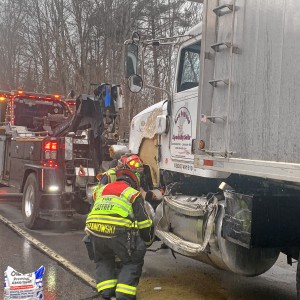 UPDATE: Drivers identified in Jaffrey dump truck crash
UPDATE: Drivers identified in Jaffrey dump truck crash
 Conant baseball shows its strength in win over Mascenic
Conant baseball shows its strength in win over Mascenic
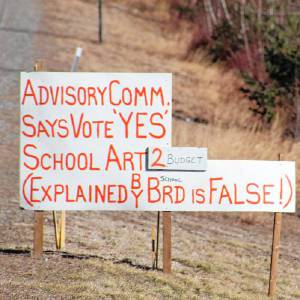 Group looks to close divide in Mascenic district
Group looks to close divide in Mascenic district
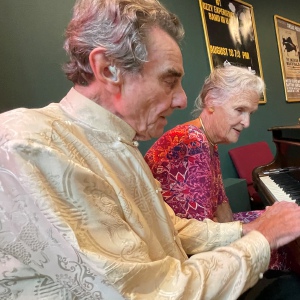 Bernie Watson of Bernie & Louise dies at 80
Bernie Watson of Bernie & Louise dies at 80
 Rindge Recreation Department organizes a trip to Converse Meadow
Rindge Recreation Department organizes a trip to Converse Meadow
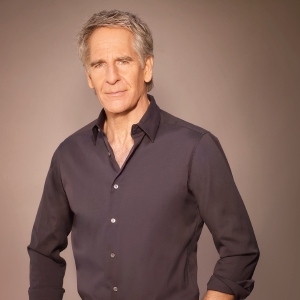 Scott Bakula starring in Peterborough Players’ ‘Man of La Mancha’
Scott Bakula starring in Peterborough Players’ ‘Man of La Mancha’
After councilors debated employer vaccine mandates and federal vaccination policy, the council voted 4-1 to reject two contracts that would have provided $27 million of federal funds to the Department of Health and Human Services for COVID-19 vaccinations.
The money would have gone to staff 13 temporary positions, and pay for equipment and supplies. With extra funding, regional public health networks could distribute booster shots and children could be vaccinated in school-based clinics when vaccines become available for children under 12, Department of Health and Human Services Commissioner Lori Shibinette said.
Shibinette told the council that refusing the federal funds would result in a higher burden for New Hampshire’s health care system, which is already struggling to treat COVID patients and deal with staffing shortages.
“A lot of our COVID vaccine response, from the state response, depends on this money,” Shibinette said. “It doesn’t mean that the vaccine is not going to be available, but it’s going to be available through the healthcare system, which right now, is struggling with staffing and struggling with their census,” she said.
Even for people who are not at high-risk of COVID itself might be impacted by overloaded hospitals, she said.
“Increased COVID rates, increased hospitalization rates, increased rates of serious illness, impacts everybody’s ability to access good quality healthcare,” Shibinette said.
Sununu said that language included in the Centers for Disease Control contract requiring the state to abide by federal rules would not require New Hampshire to apply all CDC guidelines or federal COVID mandates to its residents.
“So if the Biden administration were to put forward this OSHA mandate, this language doesn’t impede on our sovereignty as a state or impede on our ability to manage the COVID pandemic exactly as we see fit, as we’ve done for the past 18 months?” Sununu asked Attorney General John Formella.
Formella said no, and agreed that similar language had been included for past funding that New Hampshire had accepted from the federal government. He said the state still plans to sue the Biden administration over new OSHA rules related to vaccinations.
“We don’t follow all the CDC rules and regulations if they don’t apply to us. We believe in local control,” Sununu said.
As the debate veered into employer vaccine mandates, Councilor David Wheeler suggested that Sununu follow Texas Governor Greg Abbott, who issued an executive order preventing businesses from requiring their employees receive COVID-19 vaccinations.
The state of New Hampshire has not imposed vaccine mandates for its employees, but some hospitals have implemented vaccine requirements for workers.
Councilor Joseph Kenney said he was voting no on the two contracts because he feared the federal government’s influence extending into vaccinations and COVID-19 policies in New Hampshire.
“I appreciate that you have reservations, but they are fantasy,” Sununu said. Later, Sununu said rejecting the money amounted to sending New Hampshire taxpayers’ money to other states.
Councilor Cinde Warmington was the only councilor who voted to allow the Department of Health and Human Services to accept the funding.
“This is you listening to a very small, misinformed minority,” Warmington said. “The vast number of people in this state wants this vaccine and we are here to deliver it.”
About 70 percent of eligible New Hampshire residents have been vaccinated against COVID-19. As councilors debated the bill, the protestors who had been left or been arrested raised fists or thumbs-up in support of anti-vaccine statements.
Councilor Janet Stevens read a statement explaining her no vote on the contract, saying that she believed other funding sources could be used to protect those with the greatest health risks.
“I think we have alternatives for funding right in front of us that we can use, as we address misinformation and fear,” Stevens said.
At a press conference later on Wednesday, Sununu said rejecting the contracts was a mistake that would have a cascading effect on the rest of New Hampshire’s health care system.
“Our healthcare industry is already facing a chronic staffing shortage and rejection of these funds shifts our state response efforts to an already burdened healthcare industry,” Sununu said during the press conference. “Their vote, I think, shows a reckless disregard for the lives that we’re losing.”
Sununu said that declining to accept this funding could have consequences for the state’s ability to conduct COVID tests as well as vaccinations.
“At the end of the day there was no rational, logical reason to say no to these contracts,” he said.
Teddy Rosenbluth contributed reporting.
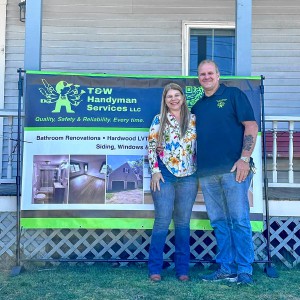 T & W Handyman Services in Jaffrey celebrates new location
T & W Handyman Services in Jaffrey celebrates new location
